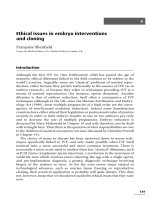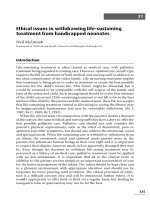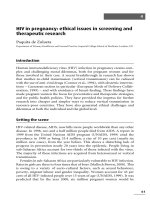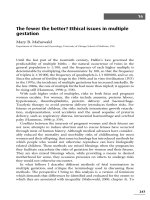Ethical issues in social work pdf
Bạn đang xem bản rút gọn của tài liệu. Xem và tải ngay bản đầy đủ của tài liệu tại đây (2.64 MB, 213 trang )
Ethical issues in social work
It has always been recognised that the practice of social work raises ethical
questions and dilemmas. Recently, however, traditional ways of
addressing ethical issues in social work have come to seem inadequate, as
a result of developments both in philosophy and in social work theory and
practice. This collection of thought-provoking essays explores the ethics
of social work practice in the light of these changes.
Ethical Issues in Social Work provides up-to-date critical analyses of the
ethical implications of new legislation in community care and criminal
justice, and of trends in social work thought and policy, such as
managerialism, user empowerment, feminism and anti-oppressive
practice.
This book provides important and stimulating reading for social work
students and their teachers, and for all practitioners and managers who are
concerned about the ethical dimensions of their work.
Richard Hugman is Senior Lecturer in Social Work at Lancaster
University and was previously a social work practitioner. David Smith, a
former probation officer, is Professor of Social Work at Lancaster
University. They are joint editors of The British Journal of Social Work.
Professional Ethics
General editors: Andrew Belsey,
Centre for Applied Ethics, University of Wales College of Cardiff
and Ruth Chadwick,
Centre for Professional Ethics, University of Central Lancashire
Professionalism is a subject of interest to academics, the general public
and would-be professional groups. Traditional ideas of professions and
professional conduct have been challenged by recent social, political and
technological changes. One result has been the development for almost
every profession of an ethical code of conduct which attempts to formalise
its values and standards. These codes of conduct raise a number of
questions about the status of a ‘profession’ and the consequent moral
implications for behaviour.
This series seeks to examine these questions both critically and
constructively. Individual volumes will consider issues relevant to
particular professions, including nursing, genetic counselling,
journalism, business, the food industry and law. Other volumes will
address issues relevant to all professional groups such as the function and
value of a code of ethics and the demands of confidentiality.
Also available in this series:
Ethical Issues in Journalism and the Media
edited by Andrew Belsey and Ruth Chadwick
Genetic Counselling
edited by Angus Clarke
Ethical Issues in Nursing
edited by Geoffrey Hunt
The Ground of Professional Ethics
Daryl Koehn
Ethical issues in social
work
Edited by Richard Hugman and
David Smith
London and New York
First published 1995
by Routledge
11 New Fetter Lane, London EC4P 4EE
Simultaneously published in the USA and Canada
by Routledge
29 West 35th Street, New York, NY 10001
Routledge is an imprint of the Taylor & Francis Group
This edition published in the Taylor & Francis e-Library, 2001.
Selection and editorial matter © 1995 Richard Hugman and David Smith, individual
chapters © 1995 the contributors
All rights reserved. No part of this book may be reprinted or reproduced or utilized in any
form or by any electronic, mechanical, or other means, now known or hereafter invented,
including photocopying and recording, or in any information storage or retrieval system,
without permission in writing from the publishers.
British Library Cataloguing in Publication Data
A catalogue record for this book is available from the British Library
Library of Congress Cataloguing in Publication Data
A catalogue record for this book is available from the Library of Congress
ISBN 0-415-10109-3 (hbk)
ISBN 0-415-10110-7 (pbk)
ISBN 0-203-01497-9 Master e-book ISBN
ISBN 0-203-17433-X (Glassbook Format)
Contents
Series editors’ foreword ix
Notes on contributors xi
1 Ethical issues in social work: an overview
Richard Hugman and David Smith
1
Introduction 1
Ethics: the means–ends relationship 2
The ‘classic’ writing: decontextualisation 3
The ‘critical’ writing: politicisation 5
The contemporary situation 6
Rethinking social work ethics 8
The contents of this book 12
2 In search of the holy grail
Naina Patel
16
Introduction 16
Starting anti-racism 17
Utilitarianism 22
Differing goals 32
3 Ethical issues in social work research
Geraldine Macdonald and Kenneth Macdonald
46
Introduction 46
Social work and research 46
Research methods and social work 49
Research interpretation 52
Research topic choice 55
Client protection 58
Coda 61
vi Contents
4 Confidentiality, accountability and the boundaries
of client–worker relationships
Steven Shardlow
65
Introduction 65
Defining confidentiality and accountability 66
Confidentiality and accountability: three dialogues 68
Comment 76
Conclusion 80
Coda for practice 81
5 The morally active practitioner and the ethics
of anti-racist social work
Charles Husband
84
Introduction 84
Ethics and moral responsibility 85
Anti-racism and social work 90
Codes, ethics, practice 96
Conclusion 99
6 Feminist ethics in practice
Sue Wise
104
Introduction 104
The feminist critique 106
Feminist social work as empowerment 108
Towards feminist anti-discriminatory practice 114
7 Managerialism and the ethics of management
Maurice Vanstone
120
Introduction 120
Support for staff 129
The use of power 130
Leadership style 132
A problem-solving model 132
Conclusion 133
8 Enforced altruism in community care
Ann Davis and Kathryn Ellis
136
Introduction 136
The political and professional context of community
care policies and practice
138
Community care: ethical dilemmas in practice 140
‘Enforced altruism’ 144
Contents vii
9 Can social work empower?
Julie Browne
155
Introduction 155
What is empowerment? 156
Social work and child sexual abuse 158
Social workers as survivors 163
Empowering social work 165
10 Towards a new view of probation values
Mike Nellis
174
Introduction 174
The limits of genericism 175
The rise of benevolent corporatism 179
Conclusion 188
Index 199
Series editors’ foreword
Applied Ethics is now acknowledged as a field of study in its own right.
Much of its recent development has resulted from rethinking traditional
medical ethics in the light of new moral problems arising out of advances
in medical science and technology. Applied philosophers, ethicists and
lawyers have devoted considerable energy to exploring the dilemmas
emerging from modern health care practices and their effects on the
practitioner–patient relationship.
But the point can be generalised. Even in health care, ethical dilemmas
are not confined to medical practitioners but also arise in the practice of,
for example, nursing. Beyond health care, other groups such as social
workers, addressed in this volume, are beginning to think critically about
the kind of service they offer and about the nature of the relationship
between provider and recipient.
One visible sign of these developments has been the proliferation of
codes of ethics, or of professional conduct. The drafting of such a code
provides an opportunity for professionals to examine the nature and goals
of their work, and offers information to others about what can be expected
from them. If a code has a disciplinary function, it may even offer
protection to members of the public.
But is the existence of such a code itself a criterion of a profession?
What exactly is a profession? Can a group acquire professional status, and
if so, how? Does the label ‘professional’ have implications, from a moral
point of view, for acceptable behaviour, and if so how far do they extend?
This series, edited from the Centre for Applied Ethics in Cardiff and the
Centre for Professional Ethics in Preston, seeks to examine these
questions both critically and constructively. Individual volumes will
x Series editors’ foreword
address issues relevant to all professional groups, such as the nature of a
profession, the function and value of codes of ethics, and the demands of
confidentiality.Other volumes will examine issues relevant to particular
professions, including those which have hitherto received little attention,
such as journalism, social work and genetic counselling.
Andrew Belsey
Ruth Chadwick
Notes on contributors
Julie Browne is a Ph.D. student at Lancaster University.
Ann Davis is Senior Lecturer in Social Work at the University of
Birmingham.
Kathryn Ellis is a Lecturer in Social Care at the University of Luton.
Richard Hugman is Senior Lecturer in Social Work at Lancaster
University.
Charles Husband is Professor of Social Analysis at the University of
Bradford.
Geraldine Macdonald is Reader in Applied Social Services at Royal
Holloway College, University of London.
Kenneth Macdonald is University Lecturer in Applied Social Sciences
and a Fellow of Nuffield College, Oxford.
Mike Nellis is a Lecturer in Probation Studies at the University of
Birmingham.
Naina Patel is a Development Officer at the Central Council for
Education and Training in Social Work, Northern Region.
Steven Shardlow is a Lecturer in Social Work Studies at the University of
Sheffield.
David Smith is Professor of Social Work at Lancaster University.
Maurice Vanstone is a Lecturer in Applied Social Studies, University
College Swansea and a Senior Probation Officer, Mid-Glamorgan
Probation Service.
Sue Wise is Senior Lecturer in Social Work, Lancaster University.
Chapter 1
Ethical issues in social work: an
overview
Richard Hugman and David Smith
INTRODUCTION
Ethical issues are at the heart of a discipline such as social work. Social
work is concerned with the care of people who have a variety of needs,
with family relationships, with social responses to offending and with
needs arising from structural causes (such as poverty). These are each, in
different ways, moral concerns, embedded in the mores of society, and so
are laden with social values (Timms 1983; Horne 1987). Herein lies the
crux of the problem, because value-statements, being views about what is
desirable in society, are highly contentious. They say ‘what ought to be the
case’ (Shardlow 1989: 3), and so open up the potential for disagreement
between individuals on grounds of belief and perception (for example, of
politics, culture or religion). Not only does this mean that an activity such
as social work will always reflect values, because it is required to
intervene in important aspects of everyday life, but that it will often be
disputed because the goals of social work may not necessarily be equally
acceptable to every member of society. To this extent, ethics and values
are inherently ‘political’, so any exploration of their implications must be
concerned also with the contested nature of social work activity.
The choice for social workers, therefore, is not whether their work has
an ethical dimension, but whether or not ethical questions are addressed
explicitly and how they are to be explored (England 1986). The various
chapters of this book engage in just such a task through the examination of
a range of contemporary social work issues, each of which poses specific
challenges to social work practice and policy.At the same time, it is
2 Richard Hugman and David Smith
recognised that the treatment of social work as a unitary phenomenon in
such matters as questions of ethics is likely to be mistaken (Timms 1983:
2). Within, as well as outside, the profession there are different
perspectives, and the discussions of the different contributors to this
volume reflect a range of approaches and positions to the topics under
examination.
ETHICS: THE MEANS–ENDS RELATIONSHIP
Ethical propositions are statements of value related to action. In the
instance of social work with which we are concerned here, ethics concern
the way in which that occupation is practised, organised, managed and
planned. Value-statements may draw on abstract or ideal notions but at the
same time they necessarily carry with them implications for the way in
which individuals act and the relationship between people as members of
social groups. For example, if we accept as an ethical principle that social
workers should demonstrate a ‘respect for persons’ (Butrym 1976) then
we must also be able to say something about the context in which action
demonstrating respect occurs and by what criteria we may decide that
respect has been demonstrated. To do otherwise is to be ‘hesitant and
clumsy’ in our analysis, or even to lack analysis altogether (Timms 1983:
28). Timms goes further, and argues that ethical principles are not fixed
directions in the manner of an instruction manual but are the basis for
making choices in situations where a range of actions is possible (ibid.:
31–2). Similarly, Horne (1987) and Shardlow (1989) have been critical of
writers on ethics and values in social work who have not grounded their
understanding within a grasp of the concrete historical demands facing
social workers day by day.
We shall return below to the specific example of ‘respect for persons’.
At this point what we are emphasising is the extent to which questions of
ethics and values have been dealt with as discrete issues in the social work
literature, rather than as facets of a wider concern with the tasks social
workers have to accomplish, the methods by which they work, the
organisation and management of their services, and the way in which all
of these things are judged. As statements of value, ethical principles
provide an important yardstick by which particular actions can be
evaluated. Moreover, they represent a measure through which the
relationship between means and ends should be made clearer.
Ethical issues in social work: an overview 3
To illustrate the connection between means and ends Jordan (1990: vii–
xiv) sketches out a fable in which the Director of Social Services in a
mythical department is challenged by service users to justify the way in
which the outcomes of services fail to reflect formal principles and
objectives. The charge is that the immediate meanings of phrases such as
‘value each client as an individual’, ‘promote human potential’ or
‘assessment of need’ (ibid.: viii) are contradicted by the experience of
receiving services. This, Jordan appears to be suggesting, is because
social work methods, theories and systems often serve to aggregate people
by type of need or problem and to deny services users’ own perceptions of
their lives, thus communicating other, unstated objectives such as
‘controlling costs’, ‘limiting criminal behaviour’ or ‘rationing scarce
resources’. This may be as a consequence of decisions taken elsewhere –
for example, in Parliament – but if this is the case then the inherent values
(as ideal objectives) are dominated by particular economic considerations
or concepts of justice, such as retribution or deterrence, which are remote
from social work practice. In such circumstances questions of ethics will
concern the principles governing the allocation of resources or access to
power in decision making (ibid.: 144).
Jordan is indicating that ethical issues cannot be divorced from the
standpoint of the actors involved. To the extent that this involves access to
resources and decision making we are talking about social power. Social
workers, along with other ‘caring’ professions, exercise considerable
power (Hugman 1991), and so this must be addressed in any discussion of
ethical issues in social work.
THE ‘CLASSIC’ WRITING: DECONTEXTUALISATION
Those writers who can be seen as forming the ‘classic’ phase in the
formulation of social work values had a common interest in elucidating
codifiable sets of principles. Probably the most influential of these was the
‘seven principles of case-work’ outlined by Biestek (1961). These
principles are:
1. unconditional acceptance of the client as a person;
2. a non-judgemental approach to clients;
3. the individualisation of the client;
4. the purposeful expression of emotion;
5. controlled emotional involvement;
4 Richard Hugman and David Smith
6. confidentiality;
7. self-determination for clients.
Similarly, Butrym (1976: 47) outlined three principles or
‘propositions’, namely:
1. a respect for individual persons;
2. a belief in the social nature of each person as a unique creature
depending on other persons for fulfilment of her or his uniqueness;
3. a belief in the human capacity for change, growth and betterment.
For Butrym these propositions underpin Biestek’s principles listed above
(1976: 48–55). They are statements of value or belief which provide the
rationale for the more action-oriented ethical principles which Biestek
had described.
Halmos (1978) similarly relates his understanding of the guiding ethics
of social work (and other counselling professions) to questions of ‘ethics’
and ‘morality’. However, Halmos’s work highlights a problem which has
continued to be a source of confusion – namely, the extent to which a
concern with ‘ethics’ can be separated from what he calls ‘moralising’
(Halmos 1978: 182–6). ‘Moralising’ is defined here as the making of
judgements about the moral worth of other people or their actions as the
basis for the provision of a social work service and so is regarded as
antithetical to the establishment of an ethical code for a profession. In this
context the rejection of moralising in favour of a concern with ethics is
equivalent to Biestek’s (1961) assertion of non-judgementalism.
A more recent example of the apparent failure to grasp this distinction
is evident in the Report of the Panel of Inquiry into the Circumstances
Surrounding the Death of Jasmine Beckford, in which the social workers
concerned claimed that their non-intervention was guided by the principle
of non-judgementalism because they did not form a negative view about
the consequences of the father’s parenting (Blom-Cooper 1985: 293–4).
A different understanding of what ‘non-judgementalism’ means might
have suggested that it was the approach taken in the assessment and not
the parenting practices in themselves which should have been subject to
evaluation against an ethical principle of this kind. The parenting itself
had to be judged, irrespective of any moral view of the parent(s), because
social workers are obliged to consider the safety and well-being of
children (see, for example, Wise 1988).
Ethical issues in social work: an overview 5
The first code of ethics for social work in the UK developed by the
British Association of Social Workers (BASW 1975) represents an
attempt to spell out the implications for practice of general ethical
propositions of the kind listed above.This requires a recognition that
social workers are not free agents, but employees of various agencies, and
they may have several points of reference as a consequence (the client,
colleagues, other professions, the employing agency and the general
public) (BASW 1975).
However, Horne (1987: 4) argues that because the BASW code starts
from an idealist set of abstractions, it, like the contemporary statements by
the qualifying council (CCETSW 1976), fails to provide adequate
guidance for social workers in the resolution of day-to-day conflicts of
interest and the discharge of their responsibilities. The conclusion drawn
is that implications of ethical principles must not only be spelt out but also
must be located in the legal, organisational and political contexts in which
social work is inevitably practised. The underlying charge is that the lists
of principles on which the early BASW and CCETSW documents were
based are decontextualised and therefore idealised in their portrayal of
social work.
THE ‘CRITICAL’ WRITING: POLITICISATION
A similar criticism is made by the body of writing which can be grouped
loosely together as ‘radical social work’. However, although these writers
share with others the view that social work ethics must be grasped from
the perspective of what actually happens in practice, the underlying theory
on which this position is based is that of Marxist (or sometimes neo-
Marxist) materialism. For example, Bailey and Brake (1975), Galper
(1975), Corrigan and Leonard (1978), and Simpkin (1979) all argue that
the framing of ethical questions as well as the answers at which one arrives
are derived from the class positions of those involved. In other words,
values are inseparable from the material relations of society.
For Simpkin the roots of orthodox social work values are to be found in
Kantian philosophy, especially that element which posits the humanity of
each individual person as an end as well as a means in our actions (Simpkin
1979: 97–100). This requires the recognition of each actual person as an
instance of the ‘general human individual’ and so establishes ethics as
impersonal principles, divorced from any recognition of the specific
characteristics of any one person. In this way, the Kantian approach leads
6 Richard Hugman and David Smith
to an apparent removal of ethical issues from the subjective world of social
relations to the level of abstraction.It is this, Simpkin concludes, which
results in notions such as ‘respect for persons’ being taken out of the social
context in which social work is practised. The ‘individualisation’ of the
client which follows therefore serves, at best, to disguise the social origin
of problems with which people are faced (such as poor housing,
unemployment and low income). At worst it results in a covert blaming of
victims (which is not made explicit, because that would be judgemental).
It may be argued that the ‘individualisation’ which Biestek (1961)
claimed as central to social work ethics was important in that it
emphasised the status of the client as a unique person, with the rights and
claims which that entails. However, the radical social work position is
critical also of this argument as taking the individual out of context. What
the materialist framework of radical social work points to is, rather, the
location of human individuality in various groups formed by divisions
within society, of which the most usual instance was class. In these terms
ethics must be built not on the assumption of a general humanity, but a
humanity that is divided within current social structures. It is impossible
to speak or act in this sense without recognising that every person is a
member of a specific social class and other objective groupings.
The critics of radical social work frequently focus on the detail of
‘radical practice’, arguing that it is barely distinguishable from ‘orthodox
practice’ (summarised, for example, by Langan and Lee 1989). At the
level of values, Timms (1983: 104) identifies a central theme in radical
social work writing of ‘the truly human’, which, he points out, itself makes
an assumption about general humanity. Timms may be mistaken when he
goes on to say that a Marxist definition of ‘truly human’ does not exist
(Marx, after all, was engaged in part in a critical ‘philosophical
anthropology’; see, for example, McLellan 1970). However, he is
accurate in his conclusion that what we are presented with is a set of claims
which compete with ‘orthodox’ values and which themselves make
philosophical assumptions which require elucidation. Moreover, many
Marxisms and neo-Marxisms have developed, so it may be inaccurate to
speak of one single position.
THE CONTEMPORARY SITUATION
The radical social work critique, while it may sometimes be seen as
remaining oppositional (Langan and Lee 1989), has also had a marked
Ethical issues in social work: an overview 7
impact on ‘conventional’ social work values. This can be seen most
clearly in the extent to which structural explanations of the problems faced
by social work clients are now incorporated in practice and teaching which
would make no explicit claims to being ‘radical’.Nowhere is this more
evident than in the terms of the Diploma in Social Work (DipSW) set out
by CCETSW (1991). Although still founded on primarily liberal
principles involving the recognition of competing value positions, social
workers are now expected to develop an awareness of structural
oppression, understand and counteract stigma and discrimination of both
individual and institutional kinds, and promote policies and practices
which are non-discriminatory and anti-oppressive (CCETSW 1991: 16).
As such, these terms attempt to contextualise ethical principles in the
manner called for by critics of earlier CCETSW documents (see above).
At the same time, as Husband argues in a later chapter in this book, they
may fail to recognise other dimensions, such as that of culture, in which
different concepts of the individual are normative.
To what extent, then, has the definition of core ethical principles in
social work shifted between Biestek (1961) and CCETSW (1991)?
Although the CCETSW document does not provide a list in quite the same
way as Biestek, it is possible to identify key points which can be compared
between the classic formulation of thirty years ago and the current
position. In Table 1 Biestek’s seven principles are listed alongside
implications embedded in Paper 30 (CCETSW 1991: 15–16).
The shift in the ethical implications for social work illustrated in this
comparison can be summarised as one from notions which are abstract
and wide-ranging to those which are more specific in scope. This can be
seen in point 2, where the move from non-judgementalism to anti-
discrimination focuses on the areas in which social workers might
introduce moral judgement, based on their own social position and
experience, in relation to class, race, gender, sexuality and disability.
Similarly, the general principle of confidentiality has become a more
specific injunction to respect privacy and to maintain confidentiality
within the limits of law, policy and procedure.
Not only does this development show something of the influence of
radical critiques on social work, but there may also be a degree of
convergence. As Pearson (1989) acknowledges, there are limits to what
social workers realistically may be expected to achieve, because they are
grounded in powerful and concrete social institutions. Therefore, a focus
on issues of discrimination and work which seeks to challenge and oppose
it has, in many ways, become the main theme of radical social work.
8 Richard Hugman and David Smith
Table 1 Comparison of ethical positions 1961–1991
In the same period the inclusion of anti-discriminatory principles has been
a major factor in shaping the recognised national qualification. Yet the
limits of any convergence can be detected in a move in the early 1990s to
launch a review of the DipSW precisely because of its specific stance on
such issues (Jones 1993). This, it may be argued, if not inevitable was at
least probable given the philosophical basis of other changes in ethical
principles, for example from self-determination to the promotion of
choice. This latter aim may be realistic (given the limitations to total
freedom of self-determination for any member of society); however, it is
an aim more closely associated with a free-market view of consumerism
(Beresford 1988). The point is that the contemporary pantheon of ethical
principles may be as internally contradictory as any which preceded it.
Contention is inbuilt. We are left with the continuing need to question and
explore the ethical dimensions to every aspect of social work. But on what
basis are we to proceed?
RETHINKING SOCIAL WORK ETHICS
The difficulty with attempts to list the ethical principles that ought to
inform social work practice – and the difficulty with any such list that we
Biestek (1961) CCETSW (1991)
1. Acceptance 1. Respect for clients’
dignity and strengths
2. Non-judgementalism 2. Non-discrimination
and anti-oppression
3. Individualisation of
the client
3. Commitment to the value
of individuals
4. Purposeful expression
of emotion
4. Counteracting stigma
5. Controlled emotional
involvement
5. Protection of
vulnerable people
6. Confidentiality 6. Privacy and
confidentiality within
contextual limits
7. Self-determination 7. Promotion of choice
Ethical issues in social work: an overview 9
can imagine – can, according to MacIntyre (1985), be traced back to the
failure of the philosophers of the late eighteenth-century Enlightenment
to provide a rational basis for morality which would command general
public assent.The principles of professional social work ethics are
necessarily derived from more general ethical propositions, as Butrym
(1976) made clear. MacIntyre argues that a genuinely shared morality
requires a justification in a shared conception of the purpose and meaning
of human life. Without such a conception (based, for example, on religious
faith or a sense of the duties entailed by citizenship) principles of ethics
are bound to lack universality, and there will be no way of conclusively
resolving competing ethical claims. Ethical arguments – for example, the
contradictory positions on the nature of justice advanced by Rawls (1972)
and Nozick (1974) – cannot be settled by an appeal to higher authority or
any general conception of what is good or right. The arguments may be
equally logical and valid in their own terms, but their basic premises – the
points from which they start – are incompatible or incommensurable, and
there is no way in which the issues they raise can be settled within the term
of conventional ethical debates.
This provides a general explanation of the internal contradictions of
both Biestek’s and the CCETSW’s lists: they incorporate principles drawn
from incompatible views of the purposes and functions of a human life.
MacIntyre offers a way out of this impasse, and we shall discuss it shortly.
The point we wish to make now, however, is that in the case of social work
the general difficulty of constructing a set of principles which could be a
useful guide to conduct is compounded because of the complexity of
many of the situations in which social workers intervene. These situations
involve conflicts of interest which cannot be resolved by an appeal to a
general ethical principle. The expression of respect or care for one person
in the situation may be seen by others as disrespectful or uncaring of their
wishes and interests; the promotion of choice for one may restrict the
choices of another; the protection of the vulnerable may entail the
attachment of stigma to someone else (for example, the stigma of being an
abusive or neglectful parent); and so on. Social workers have in practice
to decide which ethical principle has priority, in respect of whom, in
particular situations. Lists of principles are no help here, although other
sources of guidance may be available, derived from the statutory
framework within which social workers practise, such as the requirement
to give priority to the welfare of children.
Our point, which is reflected in different ways in the chapters that make
up this book, is that ethical decisions in social work are inevitably specific
10 Richard Hugman and David Smith
and contextualised. The question ‘What is it right for me to do?’ can only
be answered with reference to the immediate situation which the worker
has encountered. As Wise suggests in this volume, this stress on the
concrete and contextual in thinking about ethics has been one of the major
contributions of feminist moral philosophy (and also of feminist
psychology, which has argued that there is a characteristically ‘feminine’
approach to ethical problems (Gilligan 1982; Noddings 1984)). Feminist
ethics thus provide an example of how it is possible to move beyond the
irresolvable dilemmas which MacIntyre identifies as our inheritance from
the Enlightenment; the lack of a foundation for universal principles does
not mean that there is nothing that can usefully be said, and in this volume
the contributions of Wise and of Davis and Ellis show feminist ethics
being applied to contemporary social work issues.
Furthermore, the lists of principles raise questions as to their scope.
How broad is the context of which social workers need to take account in
making morally informed decisions? In our view, it is a merit of the
CCETSW’s list when compared with Biestek’s that it attempts to
acknowledge the broader social dimensions of social work’s
responsibilities, particularly in its concern with anti-discriminatory
practice. Inevitably, however, the ‘personalist’ focus of traditional views
of the values of social work tends to suggest that it is clear in whose
interests the social worker is acting, that we know who the ‘client’ is, and
that it is to this person that the values of respect and so on are to be applied.
A recurrent theme in the chapters which follow is that this is often
problematic, and that, so to speak, we would do well to re-emphasise the
‘social’ in social work: we would not wish to promote every choice that
someone might make (for example, a choice to continue to offend).
If attempts to state universal ethical principles are bound to fail because
they cannot refer to a shared general conception of social and moral good,
are we left with the kind of post-modernist relativism which suggests that
there is no solid ground, no foundation on which we can build, as a basis
for establishing ethical preferences? MacIntyre (1985) argues that we
should indeed abandon the notion that we can rely on ethical statements of
universal validity in order to make sense of particular situations.As a
response to this ‘post-modern’ crisis, MacIntyre suggests that we should
look back further than the eighteenth-century Enlightenment, to a
conception of ethics which he identifies as Aristotelian. This entails a
view of ethics which accepts that ‘[a]ll sources of moral authority can only
provide principles which are rooted in a particular society at a particular
point of time. There is no other kind of principle’ (Donnison 1994: 28).
Ethical issues in social work: an overview 11
And ‘if our principles are derived from a robust, relevant and living
tradition we must expect them to be constantly disputed and constantly
evolving’.
As this reference suggests, MacIntyre’s writing has had more influence
on thinking about social welfare than most recent moral philosophy. One
crucial implication of his argument, as we have seen, is that we should not
expect ethical principles to be settled or be beyond dispute, because they
are bound to be historically specific. Another, however, is that we can
develop a framework for thinking rationally about what constitutes good
social work, or what the virtues of a good social worker might be.
Following Aristotle, MacIntyre argues that (contrary to a central position
of Enlightenment philosophy) we can in some circumstances infer ‘ought’
from ‘is’. When we speak of a ‘good’ farmer, or airline pilot or nurse, we
have in mind some notion of what a farmer, pilot or nurse ought to do and
be – what virtues, specific to their calling, their practice ought to express.
These virtues can be expressed at the level of practices, in terms of an
individual life, and by reference to the tradition in which this life is being
lived. Mere ‘competency’ at the level of practice is not sufficient; it needs
to be informed by a living sense of why skilled practice matters, how it
flows from and expresses the meaning and purpose with which the
individual interprets her or his life, and how that life is connected with a
‘relevant and living tradition’.
This raises the tantalising question of whether we can specify what the
virtues of social work are, what excellences go to make good social work
practice. Without claiming that the pieces in this volume provide an
answer, we believe that they may help to clarify thinking and advance the
necessary debate. Husband’s account of the ‘morally active practitioner’,
for example, suggests some virtues for social work practice: care of others,
the courage to accept responsibility for one’s actions, scepticism about the
claims of authority, self-criticism. Other chapters suggest, among others,
the virtues of honesty (to oneself and others), a commitment to egalitarian
relationships, perseverance, and clarity of thought.All demonstrate that to
consider social work solely in terms of technical ‘competencies’, as has
been the recent trend in thinking about training needs (not least, sadly, in
statements from the CCETSW), fails to do justice to the moral complexity
of social work practice. Not only does such thinking leave much out of
account; it is also, arguably, dangerous. Social workers are statutorily
endowed with important powers over those with whom they deal: they can
deprive people of their liberty, remove children from their homes, and give
or withhold services in ways which can have far-reaching effects on
12 Richard Hugman and David Smith
people’s lives. Do we really want these powers to be exercised by people
who have no vocabulary with which to ask ethical questions of their own
practice, who are simply competent functionaries carrying out a range of
tasks set for them by someone in authority (Bauman 1989)? Our view is
rather that continuing ethical debate (even or perhaps especially when we
know that agreement will not always be reached) is essential for the moral
health of social work, and that ethically informed practice is essential if
the rights and welfare of service users/clients are to be protected.
THE CONTENTS OF THIS BOOK
The chapters which follow cover a wide variety of topics: dilemmas of
confidentiality, what constitutes ethically informed management, the
implications for ethical choices of care in or by the community, the
relevance of social work values as traditionally conceived to work with
offenders, the interaction of organisational structures and the options open
to social workers, the ethics of research and its uses, the problems of
making sense of feminist ethics in real practice situations, and the moral
stances required if anti-racist practice is taken seriously. The reader will
find differences in emphasis among the contributions, and some outright
disagreements; if he or she is logically consistent, he or she will therefore
not be able to agree with everything in the book. In the light of our
introductory comments, this is hardly surprising; and yet, as we have
suggested, there are recurrent themes in the chapters which follow, despite
their diverse topics and approaches, to which we want to draw attention
here.
First, the contributors deal with ethical issues not in an abstract or
idealised fashion but firmly within the real context of contemporary
practice. Thus Shardlow explores issues of confidentiality and the ethical
problems which attend it with reference to concrete situations rather than
to general principles;Davis and Ellis situate their discussion of the ethics
of community care in the context of current policy as it is actually being
put into practice, rather than in terms of the ideals of normalisation or
autonomy; Wise argues that much feminist writing on social work fails to
help practitioners precisely because it neglects the problems which
confront them in the settings in which most of them work; and Macdonald
and Macdonald suggest that the ethical problems of social work research
have often been misunderstood as a result of failures to consider the issues
from the point of view of actors in the real world. For all the contributors,









